What is an Economy?
An economy is the production, distribution, trade, and consumption of goods and services in a society. It is a social domain that emphasizes the practices, discourses, and material expressions that define the way resources are used to produce and distribute goods and services. The following sections discuss some of the important economic concepts.
Traditional economy
The Traditional economy is a type of economic system where traditional customs and beliefs shape the way goods and services are produced and distributed. This type of economy is often more stable and has more consistent results than other forms of economics. Traditional economy practices also help people develop more sustainable habits. They also allow people to avoid some of the problems faced by the modern world.
Traditional economies are mostly farm-based and rural, with a focus on trading. These economies are often underdeveloped and produce little surplus. Instead, surplus goods are often given to the ruling authority. These economies are often found in countries with large indigenous populations, and are most prevalent in the third world. These countries have traditional economies that rely on agriculture, fishing, and hunting to sustain themselves and their communities.
A traditional economy relies on customs and history to manage scarce resources. These economies depend on agriculture, fishing, hunting, and gathering. They also use bartering instead of money. Traditional economies are often located in developing nations, especially Asia, Africa, and South America.
Free-market economy
In a free-market economy, consumers and businesses have a great deal of freedom. Since most companies are not owned by the government, competition is encouraged and profits are increased. This is because of the profit motive, which drives investment and innovation. In addition, competition increases consumer choice. With the absence of government interference, a free-market economy encourages entrepreneurship.
Free-market economies are great sources of wealth and prosperity. However, it is important to consider the risks involved when making a financial investment. If you don’t know how to invest, you should consider consulting a financial advisor. You can find a financial professional through services like SmartAsset. This matching tool is free and can help you find the right investment for your needs and goals.
One concern of a free-market economy is the increasing levels of inequality. This problem is compounded by the fact that some members of society don’t have access to the resources they need. These include the elderly, children, and unemployed. Without enough jobs, these people will fall into poverty. Similarly, caretakers aren’t paid enough for their work. Governments will often decide to limit prices so as to prevent this from happening.
Command-based economy
The command-based economy is a type of economy where governments control the allocation of resources. Although this type of economy can be beneficial for citizens in some ways, it has some major drawbacks. For one thing, it can be inefficient since it lacks competition, which causes poor quality products and lower productivity.
This type of economy relies heavily on a central government to set prices and produce goods. While the economy is often inefficient, it is very helpful for meeting basic needs and keeping markets moving. Though it has its shortcomings, a command economy can help fill in the gaps that are present in markets. There are some pros to this type of economy, too.
Most modern countries use a combination of the market and command-based economics. Unlike the command-based economy, a market economy is driven by private enterprise. In the market, people drive the economy through supply and demand. However, the government has the right to intervene when necessary. During an economic crisis, it may be necessary to regulate and organize the economy.
In a command-based economy, the government determines what goods will be produced, how they will be sold, and how much workers will be paid. A command-based economy is often associated with communism. The government may have some of the same goals as a free market, but its overall goals are different.
Socialism in an economy is an economic system in which labor is compensated. Workers own the means of production together, and the surplus generated from the production is shared. This shared control is a form of compensation, no less than private ownership. As a result, the standard of living for workers is not the same as that of workers in capitalist societies.
The intellectual roots of socialism can be traced back to Greek philosophy. The philosopher Plato portrayed collective society in his dialogue, Republic. Later, Thomas More drew on Platonic ideals to create Utopia, a utopian society where money was banned and people lived in community. In the 19th century, the steam engine ushered in the Industrial Revolution, a period of sweeping social and economic change. While the factory owners became rich and the working class faced poverty and difficult working conditions, socialism emerged as an alternative way to improve living standards and increase happiness.
Socialists believe that the economic system should be subordinated to the democratic system and that large parts of economic life should be governed by the working class. This is because many economic issues affect the public, such as the closing of a local business or the withdrawal of financing for a shopping center. In addition, socialism argues that society’s productive assets should be used for a more humane society.
Fascism
Fascism is a form of economic system in which the state controls the economy, placing a small elite at the helm of the allocation of resources. Its primary aim is to make citizens subservient to the state. Its economic policy reflects a rejection of liberal economic dogmas. Similar economic policies were followed by Germany’s National Socialists. They mandated business-government partnerships, and regional economic chambers were overseen by the Federal Ministry of Economics.
Fascism is the result of a deteriorating economic system. While the government is supposed to represent all people and meet their needs, in reality, the government serves the interests of the most powerful capitalists in order to protect their social position and profit. When capitalism crumbles and fascism steps in, society starts to fall apart.
Fascism also causes bread shortages and higher levels of business corruption. It also makes the individual subservient to the state.
Communism
Communism is a type of government that aims to create an economic system where everyone is equally rich and poor. This economy was first proposed by Karl Marx, a German philosopher, in 1848. He argued that capitalism was a system of class distinctions that resulted in inequity. He proposed that a classless society would eliminate these problems by giving the state control over all property and wealth. According to Marx, this would eliminate the need for greed and close the wealth and property gap between the rich and poor. The poor would no longer suffer from exploitation or oppression, and they would enjoy freedom and equality.
Despite the benefits of communism, this economic system does not make economic sense for everyone. While the capitalistic system rewards those with the most money, it crushes the poor and creates winners and losers. In a communist economy, workers have as much power as the managers, and they are entitled to the same wages and benefits as the managers. The word “communism” originates from the Latin word communis, meaning a “common” or “universal” idea.
The concept of an economy is the process of people making and exchanging things. There are two types of economic systems: the free market economy and the command economy. In the free market economy, businesses are the main source of wealth while the government has a significant role in regulating the flow of goods and services.
Macroeconomics
Macroeconomics is the study of an economy on a larger scale. It can involve the entire country, a continent, or even the world. This discipline focuses on the supply and demand of goods and services, and how these factors affect the economy as a whole. It also includes the study of the role of natural resources in the production process.
The study of macroeconomics helps investors predict the future of an economy by helping them to understand the workings of the market. There are many schools of thought in this field, and each has different views of how markets function. In general, macroeconomics focuses on the overall economy, and how each market and industry is related.
To make sound macroeconomic policy, governments must study and monitor the major variables that affect the economy. This helps them predict trends and determine the best policy mix. They also develop economic models that include the various factors that affect an economy. The primary macroeconomic indicator is the GDP, which measures an economy’s size at a given point in time. It is calculated and released on a quarterly or annual basis.
The GDP of an economy is measured as the total value of goods and services produced in a country in a given year. This allows economists to determine whether or not a country is growing or stagnating. An economy’s GDP also reflects international trade. If a country exports more goods than it imports, it increases its currency value. Conversely, if it imports more goods than it exports, it creates a trade deficit, which causes its currency to be worth less than that of its trading partner.



